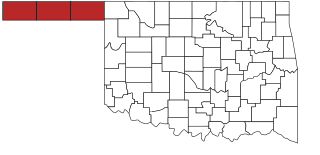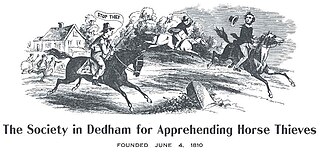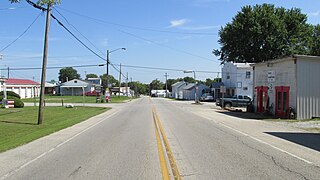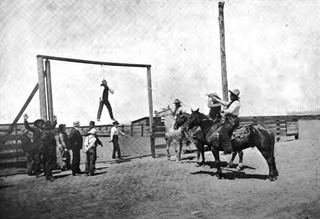A vigilance committee is a group of private citizens who take it upon themselves to administer law and order or exercise power in places where they consider the governmental structures or actions inadequate. Prominent historical examples of vigilance committees engaged in forms of vigilantism include abolitionist committees who, beginning in the 1830s, worked to free enslaved people and aid fugitive slaves, in violation of the laws at the time. However, many other vigilance committees were explicitly grounded in racial prejudice and xenophobia, administering extrajudicial punishment to abolitionists or members of minority groups.

The Oklahoma Panhandle is a salient in the extreme northwestern region of the U.S. state of Oklahoma. Its constituent counties are, from west to east, Cimarron County, Texas County and Beaver County. As with other salients in the United States, its name comes from the similarity of its shape to the handle of a pan. Its largest city is Guymon in Texas County. Black Mesa State Park, located in Cimarron County, is the highest point in the state. Other points of interest include Beaver Dunes Park, Optima Lake, and the Optima National Wildlife Refuge. Oklahoma Panhandle State University is ten miles away from Guymon.

Florence is a village in the northwestern portion of the city of Northampton, Hampshire County, Massachusetts, United States. During the 19th century, Florence was a thriving manufacturing village shaped by progressive ideas on religion, abolitionism, and education.

Henry Plummer was a prospector, lawman, and outlaw in the American West in the 1850s and 1860s, who was known to have killed several men. He was elected sheriff of what was then Bannack, Idaho Territory, in 1863 and served until 1864, during which period he was accused of being the leader of a "road agent" gang of outlaws known as the "Innocents," who preyed on shipments from what was then Virginia City, Idaho Territory to other areas. In response some leaders in Virginia City formed the Vigilance Committee of Alder Gulch and began to take action against Plummer's gang, gaining confessions from a couple of men they arrested in early January 1864. On January 10, 1864, Plummer and two associates were arrested in Bannack by a company of the Vigilantes and summarily hanged. Plummer was given a posthumous trial in 1993 which led to a mistrial. The jury was split 6–6.

The San Francisco Committee of Vigilance was a vigilante group formed in 1851. The catalyst for its formation was the criminality of the Sydney Ducks gang. It was revived in 1856 in response to rampant crime and corruption in the municipal government of San Francisco, California. The explosive population growth following the discovery of gold in 1848 was cited as the source of the alleged need for the revival of the committee. The small town of about 900 individuals grew to a booming city of over 20,000 very rapidly. Founders alleged that the growth in population overwhelmed the previously established law enforcement, and led to the organization of vigilante militia groups.

Henry Frederick Teschemacher served as the 9th mayor of San Francisco from October 3, 1859, to June 30, 1863.

The Society in Dedham for Apprehending Horse Thieves is one of the "oldest continually existing horse thief apprehending organization in the United States, and one of Dedham's most venerable social organizations." Since its founding there have been more than 10,000 members including heads of state, Supreme Court justices, governors, popes, professors, generals, and other notables.

Bentonville is a census-designated place in northern Sprigg Township, Adams County, Ohio, United States. The population was 253 at the 2020 census. It has a post office with the ZIP code 45105.

Horse theft is the crime of stealing horses. A person engaged in stealing horses is known as a horse thief. Historically, punishments were often severe for horse theft, with several cultures pronouncing the sentence of death upon actual or presumed thieves. Several societies were formed in the United States to prevent horse theft and apprehend horse thieves. However, horse theft continues to occur throughout the world, as horses are stolen for their meat, for ransom, or in disputes between their owners and other persons. Horse theft today is comparable to automobile theft, a crime punishable by felony jail time.

The Boston Vigilance Committee (1841–1861) was an abolitionist organization formed in Boston, Massachusetts, to protect escaped slaves from being kidnapped and returned to slavery in the South. The Committee aided hundreds of escapees, most of whom arrived as stowaways on coastal trading vessels and stayed a short time before moving on to Canada or England. Notably, members of the Committee provided legal and other aid to George Latimer, Ellen and William Craft, Shadrach Minkins, Thomas Sims, and Anthony Burns.

William Cooper Nell was an American abolitionist, journalist, publisher, author, and civil servant of Boston, Massachusetts, who worked for the integration of schools and public facilities in the state. Writing for abolitionist newspapers The Liberator and The North Star, he helped publicize the anti-slavery cause. He published the North Star from 1847 to 1851, moving temporarily to Rochester, New York.
The Bentonville Anti-Horse Thief Society was founded in Bentonville, Ohio in March 1853. The society was created to stop horse thievery, since horses were essential to transportation and farming in the 19th century.
The history of vigilante justice and the Montana Vigilantes began in 1863 in what was at the time a remote part of eastern Idaho Territory. Vigilante activities continued, although somewhat sporadically, through the Montana Territorial period until the territory became the state of Montana on November 8, 1889. Vigilantism arose because territorial law enforcement and the courts had very little power in the remote mining camps during the territorial period.
Stuart's Stranglers was a well-known vigilante group in Montana that was founded by wealthy ranchers in 1884 and led by Granville Stuart in response to widespread livestock theft at that time. They were also less commonly known as the "Montana Stranglers."

Committees for the Defense of the Revolution, or CDR, are a network of neighborhood committees across Cuba. The organizations, described as the "eyes and ears of the Revolution," exist to help support local communities and report on "counter-revolutionary" activity. As of 2010, 8.4 million Cubans of the national population of 11.2 million were registered as CDR members.

Joseph McNulty was an American pioneer and Old West "lawman", who served in the Kansas Legislature in 1873. He was the first member of the Kansas Legislature seated from Rooks County, Kansas.

19 Court Street is an historic building in Dedham, Massachusetts that was originally built in 1801 as a two-story, Federal-style single-family home. It was soon thereafter converted into a tavern, and hosted John Quincy Adams, Andrew Jackson, and the Marquis de Lafayette. In the 2010s it was converted into apartments. It has more than 15,000 square feet of living space.
The Red Hook Society for the Apprehension and Detention of Horse Thieves is the oldest horse thief apprehension society in the United States.

Elijah Funk Pennypacker was a politician, abolitionist and station master in the Underground Railroad in the United States, in the years leading up to the American Civil War. He operated in Chester County, Pennsylvania. Pennypacker's home, White Horse Farm, was a safe house during the time that he participated in the Underground Railroad. As a station master in the Underground Railroad, Pennypacker reportedly aided hundreds of fugitive slaves in their escape to freedom, without any having been apprehended by authorities or by bounty hunters. He also served as a member of the Pennsylvania House of Representatives, representing Chester County from 1832 to 1833 and from 1835 to 1836.
In the early hours of June 1866, an alleged notorious horse thief named Garrett Thompson was taken from the Monroe County jail and lynched. Thompson was accused of horse stealing and other outrages including house burning and murder.













